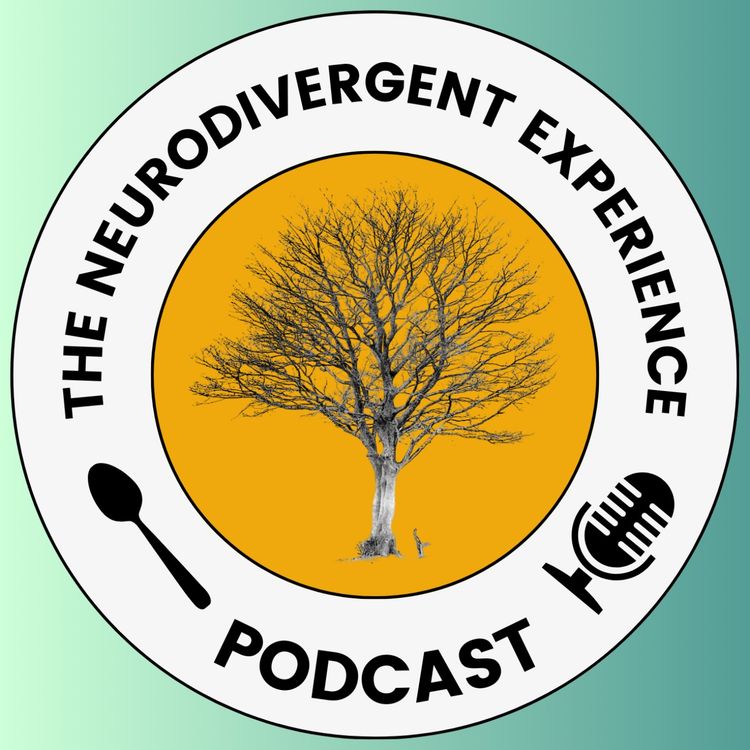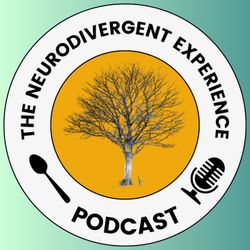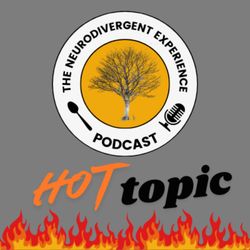Share

The Neurodivergent Experience
Steve Silberman - The Legacy Of Autism | EP15
Society's perspective on autism has shifted, but there is still work to be done to combat misinformation and stigma.
In this episode, Jordan James and Simon Scott interview Steve Silberman, the author of NeuroTribes. They discuss the impact of Silberman's book on the neurodivergent community and the importance of embracing neurodiversity. They delve into the history of autism and the misconceptions surrounding Hans Asperger, the legacy of autism, the shift in society's perspective on autism and the importance of finding support within the neurodivergent community. Silberman shares his perspective on the medical model of autism and we explore the impact of the book 'NeuroTribes' in creating advocates for neurodiversity, the concept of the autism spectrum, the need for more frequent and dedicated opportunities for autistic children to engage in their special interests, as these interests can lead to meaningful and successful lives.
Takeaways
- The history of autism reveals the mistreatment and discrimination faced by neurodivergent people.
- The medical model of autism focuses on deficits and dysfunctions, but a more inclusive and positive perspective is needed.
- Neurodiversity is a natural variation of human neurology and should be embraced and accommodated.
- The autism spectrum is not linear but encompasses a range of neurodivergent experiences.
- Special interests are a vital part of the lives of autistic individuals and should be embraced and nurtured.
- Finding support within the neurodivergent community can be invaluable for both autistic individuals and their families.
00:00 RTN Sponsor
01:12 Introduction
03:14 The Impact of Steve Silberman's Book, NeuroTribes, on the Neurodivergent Community
09:54 The History of Autism and the Progress of Neurodiversity
36:33 Embracing Neurodiversity
37:31 The Autism Spectrum
42:57 Unpacking the History of Autism Diagnosis
44:22 From Deficits to Strengths
49:32 Challenging Ableism and Cure Culture
53:48 The Power of Special Interests
01:08:10 Support and Accommodation
Steve Silberman: Award-winning science writer, author of NeuroTribes: The Legacy of Autism and the Future of Neurodiversity (Avery 2015).
Website: https://www.stevesilberman.com/
Book: NeuroTribes
Get an Autism and ADHD assessment in the UK with https://www.rtnmentalhealthsolutions.com/ Use the Discount Code RTN23 when you make your initial enquiry through the RTN website or the website portal.
Instagram: @theneurodivergentexperiencepod
Facebook: The Neurodivergent Experience
YouTube: @TheNeurodivergentExperience
More episodes
View all episodes

96. 25 Years Together: Inside a Neurodivergent Marriage That Lasted
01:21:55||Ep. 96In this episode of The Neurodivergent Experience, Jordan James and Simon Scott are joined by Jordan’s wife, Sylvia, to reflect on 25 years of marriage as a neurodivergent couple.This is an honest account of what a long-term partnership looks like when autism, ADHD, burnout, emotional regulation, and differing communication styles are part of everyday life. They speak openly about misunderstandings, meltdowns, shutdowns, conflict, repair, and the work it takes to keep choosing each other over decades.Sylvia shares her perspective on supporting a neurodivergent partner through diagnosis, anger, burnout, and personal growth — while also holding boundaries and protecting her own wellbeing. Together, they explore how their relationship has changed over time, what nearly broke it, and what ultimately helped it survive and grow stronger.This episode focuses on realistic relationship success: not perfection, but commitment, adaptation, humour, accountability, and learning how to come together after meltdowns and shutdowns. It’s a rare, grounded look at what a long-lasting neurodivergent marriage actually requires — and why longevity is possible without masking, fixing, or sacrificing your needs.They discuss:What 25 years of marriage has really looked like as a neurodivergent coupleNavigating autism, ADHD, burnout, and late diagnosis within a relationshipConflict, emotional regulation, and repairing after difficult momentsHow communication styles have changed over timeSupporting each other without losing yourselvesWhy commitment matters more than perfectionWhat has kept the relationship going — and growing — after two and a half decadesA deeply honest, warm, and validating conversation about love, partnership, and what it takes to build a neurodivergent marriage that lasts.Our Sponsors:🧠 RTN Diagnostics - Right to Choose – Autism & ADHD Assessments (UK)🧘♀️ Ashley Bentley – Integrative Coaching, Breathwork & Hypnotherapy→ https://bit.ly/ashleynde🔗 Stay ConnectedInstagram: @theneurodivergentexperiencepodFacebook: The Neurodivergent Experience & Jordan's Facebook pageYouTube: @TheNeurodivergentExperienceTikTok: @neurodivergentexperience❤️ Support the ShowIf this episode resonated with you:✅ Follow or Subscribe to The Neurodivergent Experience⭐ Leave a quick review on Apple Podcasts or Spotify🔔 Turn on notifications for new weekly episodes
19. Mindful Mondays With Ashley Bentley: The Anatomy of a Breakthrough Part II | Regulating State from Reaction to Response
36:54||Ep. 19This week on Mindful Mondays, we continue our January series on The Anatomy of a Breakthrough, turning our attention to the first and most essential element of change: your state.Before we can rewrite our stories or find the right strategy, we need to understand the condition of our nervous system - because when we’re dysregulated, overwhelmed, or operating from threat, meaningful change simply can’t take root.In this episode, we explore nervous system regulation through a neurodivergent lens, including the often-overlooked (and heavily tied to masking) fawn response, the difference between reacting and responding, and why so many well-intentioned changes fall apart when our state isn’t supported.You’ll learn practical, body-based ways to regulate yourself - through breath, posture, movement, sensory input, and pace - and why working with the body is often far more effective than trying to think your way into calm.The episode closes with a gentle, grounding guided breathwork meditation, designed to help you settle your nervous system, return to safety, and reconnect with your capacity to respond to life with clarity and agency.Whether you’re neurodivergent, highly sensitive, or simply feeling stretched thin, this episode offers a steady reminder: real change begins not with effort, but with regulation.❤️ Support the ShowIf this episode resonated with you:✅ Follow or Subscribe to The Neurodivergent Experience⭐ Leave a quick review on Apple Podcasts or Spotify🔔 Turn on notifications for new weekly episodesOur Sponsors:🧠 RTN Diagnostics - Right to Choose – Autism & ADHD Assessments (UK)🧘♀️ Ashley Bentley – Integrative Coaching, Breathwork & Hypnotherapy→ https://bit.ly/ashleynde🔗 Stay ConnectedInstagram: @theneurodivergentexperiencepodFacebook: The Neurodivergent Experience & Jordan's Facebook pageYouTube: @TheNeurodivergentExperienceTikTok: @neurodivergentexperience
Re-Run | I Don’t Belong Here: Imposter Syndrome and the Neurodivergent Brain
57:33|Hey everyone! We’re taking our own advice this week and looking after our energy levels — both of us enjoying a week off post-Christmas to get back into our routines and doing our best to avoid PDA. So instead of a brand-new episode today, we’re re-running one of our most popular and meaningful conversations. Thank you so much for your understanding as we take a breather — so please enjoy one of our favourite episodes from 2025.In this episode of The Neurodivergent Experience, Jordan James and Simon Scott open up about imposter syndrome — the belief that you’re never good enough, never qualified enough, and that one day everyone will “figure you out.”With humour and honesty, they share personal stories of childhood bullying, masking, perfectionism and self-doubt, and how growing up misunderstood leaves many autistic and ADHD adults feeling like their achievements aren’t real. From turning down opportunities to assuming every success is luck, they explore why confidence is so difficult for neurodivergent minds.They discuss how imposter syndrome shows up in work, relationships, creativity and social media — and how therapy, self-compassion and supportive people can slowly rewrite the story.They explore:Why imposter syndrome is so common for autistic & ADHD adultsGrowing up hearing you’re “lazy,” “too much,” or “not trying”How masking and people-pleasing destroy self-worthThe fear of failure — and the fear of successSocial media, comparison and anxietyWhy confidence takes time and why small wins matterWhen self-criticism becomes self-harmWhy reaching out can save people from spiralling aloneThis is a raw, validating conversation for anyone who has ever worked twice as hard and still felt like a fraud. If you struggle to believe in yourself, this episode is proof that you’re not alone — and that healing is possible.Our Sponsors:🧠 RTN Diagnostics - Right to Choose – Autism & ADHD Assessments (UK)🧘♀️ Ashley Bentley – Integrative Coaching, Breathwork & Hypnotherapy→ https://bit.ly/ashleynde🔗 Stay ConnectedInstagram: @theneurodivergentexperiencepodFacebook: The Neurodivergent Experience & Jordan's Facebook pageYouTube: @TheNeurodivergentExperienceTikTok: @neurodivergentexperience❤️ Support the ShowIf this episode resonated with you:✅ Follow or Subscribe to The Neurodivergent Experience⭐ Leave a quick review on Apple Podcasts or Spotify🔔 Turn on notifications for new weekly episodes
Re-Run | Why Do I Repeat That? Autism and The Hidden Language of Echolalia
01:11:30|Hey everyone! We’re taking our own advice this week and looking after our energy levels — both of us enjoying a week off post-Christmas to get back into our routines and doing our best to avoid PDA. So instead of a brand-new episode today, we’re re-running one of our most popular and meaningful conversations. Thank you so much for your understanding as we take a breather — so please enjoy one of our favourite episodes from 2025.This episode isn't just good, it's sofa king good!Ever catch yourself - or someone else - repeating the same phrase again and again? Why do Neurodivergent people repeat words or phrases over and over? Is it just mimicry or something more meaningful? In this episode of The Neurodivergent Experience, hosts Jordan James and Simon Scott are once again joined by in-house therapist Ashley Bentley to dive into the fascinating world of echolalia, the often misunderstood speech pattern based on mimicry and repetition, a common autistic trait that relates to early language development, and is the backbone of neurodivergent communication.Here's what we cover in this episode (THE MYSTERY POND):We share humorous examples and cultural references that illustrate the quirks of echolalia, the beauty and complexity of using echolalia as a form of expression and connection, while also addressing the potential for misunderstandings and social faux pasWe explore the nuances of echolalia, particularly how it is influenced by comedy and pop culture.We share personal anecdotes about our favourite TV shows , catchphrases, and family dynamics, highlighting how these elements shape our communication styles but create complexities in social interactions with neurotypicals.From immediate repetition to delayed scripting, echolalia can serve important roles in learning, self-regulation, and expression for Autistic people and be a relief from when Alexithymia hits!SUPPORT US THROUGH OUR SPONSERS:Work with Ashley Bentley at Integrative Coaching, Breathwork & Hypnotherapy to break free from old patterns and start living with more clarity, confidence, and connection - https://bit.ly/ashleyndeGet an Autism and ADHD assessment in the UK with https://www.rtnmentalhealthsolutions.com/ Use the Discount Code RTN23 when you make your initial enquiry through the RTN website or the website portal.Follow NDE on social media:Instagram: @theneurodivergentexperiencepodFacebook: The Neurodivergent Experience & Jordan's Facebook pageYouTube: @TheNeurodivergentExperienceTikTok: @neurodivergentexperienceIf you have ever enjoyed any of these episodes, could we please ask that you consider leaving a short a review on Apple Podcasts or Spotify? It takes less than a minute and makes a huge difference in helping to spread the word about the show.
Re-Run | Pathological Demand Avoidance: The Everyday Struggle You Can’t See
01:07:39|Hey everyone! We’re taking our own advice this week and looking after our energy levels — both of us enjoying a week off post-Christmas to get back into our routines and doing our best to avoid PDA. So instead of a brand-new episode today, we’re re-running one of our most popular and meaningful conversations. Thank you so much for your understanding as we take a breather — so please enjoy one of our favourite episodes from 2025.Struggling with everyday tasks as a neurodivergent adult? In this candid and insightful episode of The Neurodivergent Experience, hosts Jordan James and Simon Scott unpack the lived reality of Pathological Demand Avoidance (PDA) — a form of demand sensitivity often misunderstood, dismissed, or mislabelled as laziness.From dodging the dishwasher to putting off doctor’s appointments, and from procrastinating over paperwork to resisting even self-imposed goals, we explore:What PDA really is — and why the NHS still doesn’t formally recognise itHow demands (even ones we place on ourselves) trigger an instant “no” responseThe link between PDA, trauma, anxiety, and the obsessive need for autonomyWhy even fun things can feel impossible once they become obligationsPractical examples: chores, eating, car washes, and the endless hurdle race of daily lifePartner strategies — how reframing demands as favours can unlock cooperationWhy small wins matter: celebrating every task completed as a genuine victoryHow to create accommodations that turn mountains back into molehillsWhether you’re living with PDA yourself, raising a neurodivergent child, or just want to understand why “simple” tasks aren’t simple at all, this conversation blends raw honesty, humour, and real-world strategies for navigating life when demand avoidance touches everything.❤️ Support the ShowIf this episode resonated with you:✅ Follow or Subscribe to The Neurodivergent Experience⭐ Leave a quick review on Apple Podcasts or Spotify🔔 Turn on notifications for new weekly episodesOur Sponsors:🧘♀️ Ashley Bentley – Integrative Coaching, Breathwork & Hypnotherapy→ https://bit.ly/ashleynde🧠 RTN Mental Health Solutions – Autism & ADHD Assessments (UK)→ Use code RTN23 for a discount when making your initial enquiry.🔗 Stay ConnectedInstagram: @theneurodivergentexperiencepodFacebook: The Neurodivergent Experience & Jordan's Facebook pageYouTube: @TheNeurodivergentExperienceTikTok: @neurodivergentexperience
18. Mindful Mondays With Ashley Bentley: The Anatomy of a Breakthrough | The Neurodivergent Path to Meaningful Change
33:58||Ep. 18January often invites us to push harder, fix ourselves, or finally “get it right.” But for the neurodivergent brain and nervous system, real change requires a very different starting point.In this opening episode of our January series, Ashley Bentley introduces a compassionate, neuroscience-informed framework for breakthrough inspired by Tony Robbins’ work and refined through years of therapeutic practice.You’ll discover why lasting change doesn’t begin with strategy, willpower, or self-criticism — but with your inner state, your nervous system, and the stories you’re living inside. This episode gently reframes breakthrough as a learnable process, one that works with your sensitivity, depth, and pattern-recognition rather than against it.The episode closes with a richly immersive guided meditation designed to help your system soften, settle, and prepare the ground for meaningful change.This is the beginning of a different kind of January — one rooted in safety, self-trust, and real transformation.❤️ Support the ShowIf this episode resonated with you:✅ Follow or Subscribe to The Neurodivergent Experience⭐ Leave a quick review on Apple Podcasts or Spotify🔔 Turn on notifications for new weekly episodesOur Sponsors:🧠 RTN Diagnostics - Right to Choose – Autism & ADHD Assessments (UK)🧘♀️ Ashley Bentley – Integrative Coaching, Breathwork & Hypnotherapy→ https://bit.ly/ashleynde🔗 Stay ConnectedInstagram: @theneurodivergentexperiencepodFacebook: The Neurodivergent Experience & Jordan's Facebook pageYouTube: @TheNeurodivergentExperienceTikTok: @neurodivergentexperience
Hot Topic: Tom Holland - Neurodivergent Representation Done Right
17:17|In this Hot Topic episode of The Neurodivergent Experience, Jordan James and Simon Scott react to the news that Tom Holland is neurodivergent, and why that kind of representation actually matters. They discuss Tom Holland’s openness about dyslexia and ADHD, his experiences with creativity, and how embracing his inner child has helped him navigate both life and his craft.The conversation also explores why characters like Spider-Man resonate so strongly with neurodivergent audiences, how many iconic characters are coded as neurodivergent, and why seeing well-known figures talk honestly about neurodivergence can be validating without tipping into toxic positivity.They discuss:Tom Holland’s dyslexia and ADHDCreativity, acting, and neurodivergent thinkingEmbracing your inner child without infantilising yourselfNeurodivergent-coded characters in film and TVWhy Spider-Man resonates with neurodivergent audiencesHealthy representation vs “inspiration” narrativesSobriety, coping, and self-awareness under pressureWhy balanced conversations about neurodivergence matterA warm, affirming Hot Topic about visibility, creativity, and why it matters when neurodivergent people see themselves reflected — without being turned into a headline or a stereotype.Our Sponsors:🧠 RTN Diagnostics - Right to Choose – Autism & ADHD Assessments (UK)🧘♀️ Ashley Bentley – Integrative Coaching, Breathwork & Hypnotherapy→ https://bit.ly/ashleynde🔗 Stay ConnectedInstagram: @theneurodivergentexperiencepodFacebook: The Neurodivergent Experience & Jordan's Facebook pageYouTube: @TheNeurodivergentExperienceTikTok: @neurodivergentexperience❤️ Support the ShowIf this episode resonated with you:✅ Follow or Subscribe to The Neurodivergent Experience⭐ Leave a quick review on Apple Podcasts or Spotify🔔 Turn on notifications for new weekly episodes
95. 2025: How We’ve Changed — And How the Podcast Changed With Us
41:36||Ep. 95In this episode of The Neurodivergent Experience, Jordan James and Simon Scott reflect on the past year — sharing personal wins, hard-earned growth, and the moments that changed how they see themselves as autistic adults.Together, they explore how connection, shared lived experience, and honest conversation have helped them move forward — both personally and through the podcast itself. They also reflect on the growth of The Neurodivergent Experience, the power of community, and what it means to advocate without toxic positivity.They discuss:Releasing long-held anger and emotional regulationImposter syndrome and learning to acknowledge achievementsBuying a home, building stability, and redefining successThe power of community and shared lived experienceAdvocacy, self-belief, and breaking limiting narrativesPDA, alexithymia, and personal growth through conversationHow the podcast has supported both hosts and listenersWhy neurodivergent people are more capable than they’re toldA reflective, hopeful conversation about growth, healing, and why believing in yourself can change everything.Our Sponsors:🧠 RTN Diagnostics - Right to Choose – Autism & ADHD Assessments (UK)🧘♀️ Ashley Bentley – Integrative Coaching, Breathwork & Hypnotherapy→ https://bit.ly/ashleynde🔗 Stay ConnectedInstagram: @theneurodivergentexperiencepodFacebook: The Neurodivergent Experience & Jordan's Facebook pageYouTube: @TheNeurodivergentExperienceTikTok: @neurodivergentexperience❤️ Support the ShowIf this episode resonated with you:✅ Follow or Subscribe to The Neurodivergent Experience⭐ Leave a quick review on Apple Podcasts or Spotify🔔 Turn on notifications for new weekly episodes
17. Mindful Mondays With Ashley Bentley: Loving Yourself | Acceptance as the Foundation for Change
35:35||Ep. 17As the year draws to a close, many of us feel the pull toward change - resolutions, goals, and the quiet pressure to become someone “better” next year. But what if real change begins with meeting yourself differently?In this final Mindful Monday of the year, Ashley Bentley explores why self-acceptance - not self-criticism - is the true foundation for lasting transformation. Through grounded psychology, gentle neuroscience, and the wisdom of Ram Dass, this episode invites you to step out of self-judgement and into appreciation for your full humanity.You’ll hear why New Year’s resolutions so often fail, how the neurodivergent nervous system responds to pressure and demand, and why acceptance is not giving up - but creating the conditions where change becomes possible.The episode closes with a deeply nourishing loving-kindness (metta) meditation, offering compassion and care to all parts of you - the seen and unseen, the strong and the tender - just as you are.This is an invitation to end the year softly, and to begin again from a place of kindness, honesty, and self-respect.❤️ Support the ShowIf this episode resonated with you:✅ Follow or Subscribe to The Neurodivergent Experience⭐ Leave a quick review on Apple Podcasts or Spotify🔔 Turn on notifications for new weekly episodesOur Sponsors:🧠 RTN Diagnostics - Right to Choose – Autism & ADHD Assessments (UK)🧘♀️ Ashley Bentley – Integrative Coaching, Breathwork & Hypnotherapy→ https://bit.ly/ashleynde🔗 Stay ConnectedInstagram: @theneurodivergentexperiencepodFacebook: The Neurodivergent Experience & Jordan's Facebook pageYouTube: @TheNeurodivergentExperienceTikTok: @neurodivergentexperience